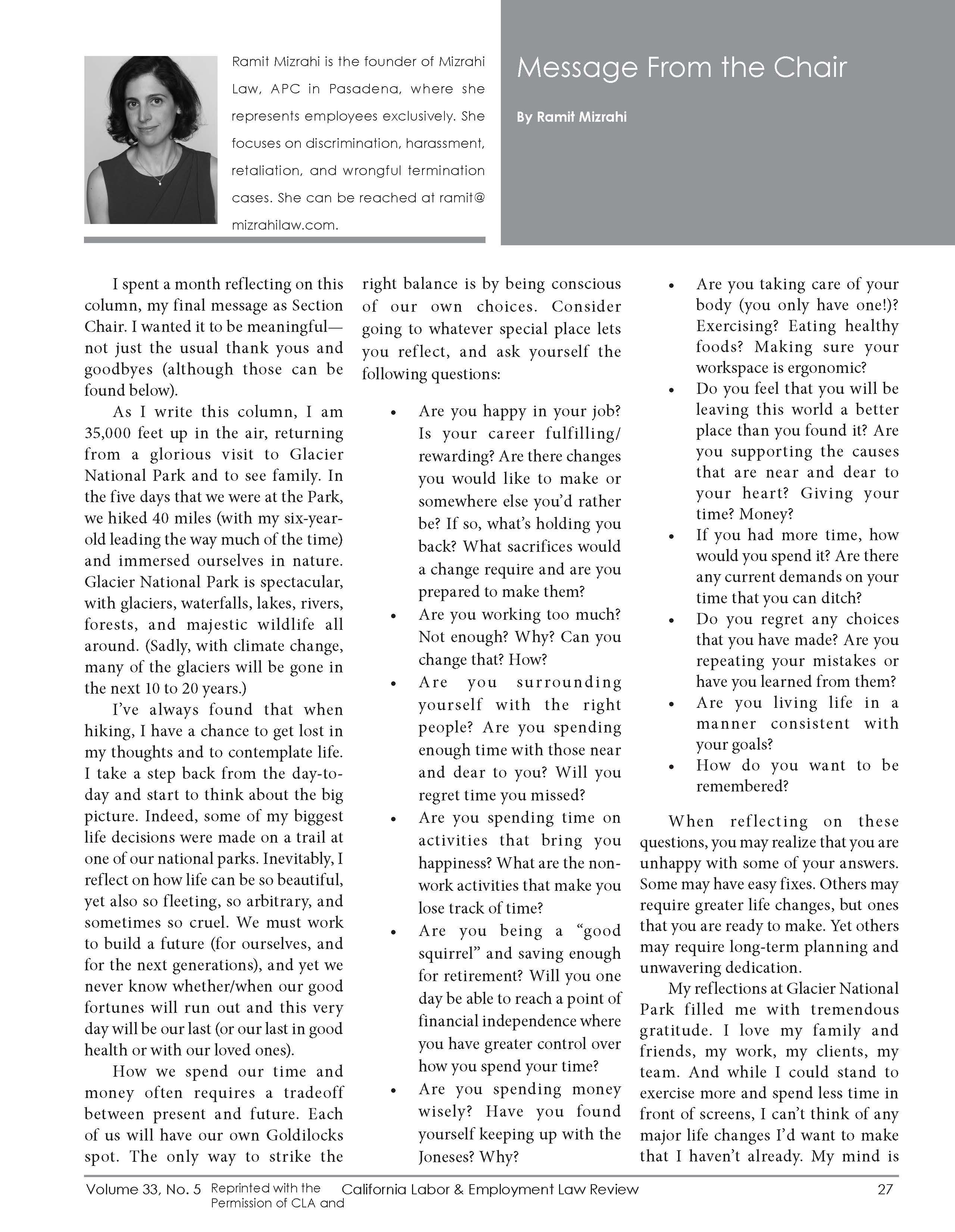-

The federal minimum wage has remained at $7.25 per hour for over a decade–not enough to keep a family of two above the federal poverty line. In an effort to keep people out of poverty, twenty-nine states and the District of Columbia have set their own minimum wage, as have numerous cities and counties. Here in California, we are moving toward a $15 per hour minimum wage for all workers by 2023; Los Angeles will reach a $15 per hour minimum wage for all workers by July 2021. Details about the Los Angeles and California minimum wages can be found in this post.
Today, the Washington Post reported on powerful new research published in the Journal of Epidemology & Community Health, which found that a $1 increase in the minimum wages was linked to a 3.4–5.9% decrease in the suicide rate among adults with a high school education or less. The largest effects were found when unemployment rates were high.
In the United States, suicide accounts for approximately 19% of deaths in adults ages 18 to 24 and 11% of deaths in adults ages 25 to 44. Financial stressors are often a factor. For example, the report cited research that “an estimated 1.7% of unemployed US adults attempted suicide in 2017, compared with 0.4% of those working full-time and 0.7% for those working part-time.”
The report estimates that, between 2009 and 2015, 13,800 suicides could have been prevented among those ages 18–64 years with a high school education or less given an increase in the minimum wage equivalent to $1 above prevailing levels; a $2 increase could have prevented 25,900 suicides.
I have written many times about the importance of raising the minimum wage and creating a social safety net for those in need (for example, here, here, and here). Indeed, my master’s thesis was about single mothers, poverty, and the minimum wage. This new research shows just how important it is that we ensure that workers can make a living wage to support themselves and their families.
-
31 Dec '19

We at Mizrahi Law wish you a Happy New Year!
We are very much looking forward to the new year. 2020 stands to be a terrific year for California employees, with some exciting new employment laws going into effect on January 1!
In addition, the State minimum wage increases on January 1 to $13 per hour for large employers (26 or more employees) and $12 per hour for small employers (25 or fewer employees). The City of Los Angeles minimum wage, currently set at $14.25 per hour for large employers and $13.25 for small employers, will increase to $15 per hour and $14.25 per hour, respectively, on July 1, 2020.
-

On October 28, 2019, Motherboard magazine published an article about a particularly egregious case of pregnancy discrimination. The article, titled “Engineer Says Software Firm Cut Her Maternity Leave Short After Her Baby Died,” interviewed Ramit Mizrahi as a subject matter expert on pregnancy discrimination in the tech field. Ramit explained the problem as follows:
“Pregnancy discrimination is a big issue within Silicon Valley. . . Managers start thinking to themselves, ‘If this person is going to be out for four to six months, how are we going to make do? How are we going to function?’ And, unfortunately, this sometimes leads to them denying the pregnant employee opportunities, taking away her job duties, even replacing her or eliminating her role because she took time off. All of these things are illegal.”
“If a company was planning to give someone a promotion, and then finds out that the person is pregnant, they still have to give them that promotion,” she said. “They can’t just say, ‘This isn’t convenient for us.’ But situations do play out this way, and pregnant women are denied opportunities.”
She also explained how Silicon Valley’s gender imbalance and the fact that employees tend to skew younger both contribute to discrimination against pregnant employees/mothers and those who take protected job leaves.
The article can be found here.
-
13 Oct '19

2019 has turned out to be a bumper year for employment legislation. The continued influence of the #MeToo movement can be seen in the number of bills meant to protect employees who have suffered harassment, discrimination, and retaliation. The California Legislature also targeted arbitration abuse, worker misclassification, and other wage and hour law violations. Below, we cover the top employment laws that were signed into law or vetoed this legislative session.
1. Bills Signed Into Law
AB 5 — Dynamex codification; independent contractors
- Codifies the Dynamex Operations West, Inc. v. Superior Court of Los Angeles (2018) 4 Cal.5th 903 “ABC” test to determine whether a worker is an independent contractor or employee, with specified statutory exemptions. Under this test, an employer seeking to classify a worker as an independent contractor bears the burden of establishing:
(A) that the worker is free from the control and direction of the hiring entity in connection with the performance of the work, both under the contract for the performance of the work and in fact, (B) that the worker performs work that is outside the usual course of the hiring entity’s business, and (C) that the worker is customarily engaged in an independently established trade, occupation, or business. . . .
- Applicable retroactively to all claims under Labor Code related to Wage Orders; prospectively to all other Labor Code claims. Applicable prospectively with respect to unemployment insurance.
- Contains numerous statutory exemptions, which apply retroactively. In these circumstances, apply the test laid out in S. G. Borello & Sons, Inc. v. Department of Industrial Relations (1989) 48 Cal.3d 341.
- Prohibits employees from reclassifying existing employees as independent contractors.
More on AB 5 can be found in this blog post.
AB 9 — Increases Time to File Employment Discrimination Claim
- Gives employees more time to bring employment discrimination claims (including harassment and retaliation claims) by extending the deadline to file a verified complaint with DFEH for employment discrimination claims from one to three years.
- Date of verified complaint relates back to filing of intake form with the DFEH.
- Codifies the Dynamex Operations West, Inc. v. Superior Court of Los Angeles (2018) 4 Cal.5th 903 “ABC” test to determine whether a worker is an independent contractor or employee, with specified statutory exemptions. Under this test, an employer seeking to classify a worker as an independent contractor bears the burden of establishing:
-

Update 9/15/21: On September 15, 2021, in Chamber of Commerce of the U.S., et al. v. Bonta, et al., No. 20-15291, 13 F.4th 766 (9th Cir. Sept. 15, 2021), the Ninth Circuit issued a ruling upholding most of AB 51. On October 20, 2021, the U.S. Chamber of Commerce filed a petition with the Ninth Circuit requesting a rehearing en banc, seeking to reverse this decision. That petition is currently pending before the court.
Update 1/7/2020: A federal district court has issued a temporary restraining order blocking enforcement of AB 51. A hearing is set in the case for January 10, 2020.
Update 10/10/2019: Governor Newsom signed AB 51 into law today.
The California Legislature is trying for a third time to protect workers from being forced to sign arbitration agreements. It passed Assembly Bill 51 (“AB 51”), which, if it becomes law, will: (1) prohibit employers from conditioning employment, continued employment, or any employment-related benefit on the applicant or employee waiving rights under the Fair Employment and Housing Act (“FEHA”) or the Labor Code, including the right to proceed in civil court; (2) prohibit employers from retaliating against an applicant or employee for refusing to waive employment-related rights; and (3) deem violations of these provisions as “unlawful employment practices” under the FEHA.
AB 51 follows in the footsteps of two nearly identical bills that then Governor Jerry Brown vetoed in 2015 and 2018. In his September 2018 veto message for Assembly Bill 3080 (“AB 3080”), Governor Brown expressed his belief that the bill ran afoul of U.S. Supreme Court precedent and “plainly violate[d] federal law.” He believed that California was preempted from interfering with the formation of arbitration agreements.
Proponents of the bill disagree with Governor Brown’s analysis and argue that AB 51 will survive judicial scrutiny. As reflected in AB 51’s bill analysis, they argue that it “simply gives the worker the option of whether or not to form the contract in first place,” and “nothing in AB 51 selectively calls out arbitration contracts . . . .”[1] They further contend that “[a]ll the bill does is say that an employee cannot be forced to sign an arbitration agreement, and if the employee elects not to, the employee cannot be retaliated against.”[2]
-

Over the past two years, we have followed the many bills that the California legislature has passed with the momentum of the #MeToo and #TimesUp movements. From last year’s omnibus sexual harassment bill (SB 1300), to the prohibition of confidentiality provisions in settlement agreements involving sexual harassment claims (SB 820), to the increase in time that employees would have to file claims under the Fair Employment and Housing Act (AB 9), these bills have been designed to increase protections for California workers.
Assembly Bill 749 (“AB 749”), introduced by Assemblymembers Mark Stone, Lorena Gonzalez, and Eloise Reyes, is another #MeToo-inspired bill meant to protect employees. It tackles “no rehire” provisions that are frequently found in settlement agreements. Employees who settle their claims against their employers are often required to agree that they will never again work for the same employer or its related entities. Such provisions are punitive and can have a devastating impact on an employee, forcing some to leave their field or severely limiting their future employment prospects. The use of “no rehire” provisions often leads to the perverse outcome where victimized employees are forced out of their jobs while harassers continue to be employed.[1]
AB 749, signed into law by Governor Newsom on October 12, 2019, prohibits and invalidates all provisions in settlement agreements that prevent workers from obtaining future employment with the settling employer or its affiliated companies. Through newly created Code of Civil Procedure section 1002.5, it makes such provisions in agreements entered into on or after January 1, 2020 void as a matter of law and against public policy. The bill is co-sponsored by the California Employment Lawyers Association and Equal Rights Advocates.
-

Update 10/10/2019: Governor Newsom signed SB 142 into law today.
On September 11, 2019, the California Legislature passed Senate Bill 142 (“SB 142”), which would significantly expand lactation accommodations and protections for working mothers. Among other things, SB 142 would: (1) clarify employer obligations to provide breaks to nursing/pumping mothers; (2) require employers to provide safe and sanitary lactation rooms for employees wishing to express milk; (3) increase penalties for non-compliance; (4) prohibit discrimination and retaliation against employees who exercise or attempt to exercise their right to lactation accommodations; and (5) require that employers implement lactation accommodation policies.
SB 142 comes on the heels of last year’s Assembly Bill 1976 (“AB 1976”). AB 1976 required that employers “make reasonable efforts” to provide a lactation room other than a bathroom. Under SB 142, employers must provide such a room, subject to a limited undue hardship exemption.[1]
Given Governor Gavin Newsom’s support for the expansion of paid family leave from six weeks to eight weeks, and his championing of increased worker protections, we are optimistic that he will sign SB 142 into law.
WHAT DOES SB 142 DO?
SB 142, introduced by Senator Scott Weiner (D-San Francisco) and principally co-authored by Assemblymember Lorena Gonzalez (D-San Diego), amends Labor Code sections 1030, 1031, and 1033 and adds section 1034. The amendments and additions, which are discussed below, significantly expand lactation accommodations and protections for working mothers.
-
The September 2019 issue of the California Lawyers Association’s Labor & Employment Law Review featured Ramit Mizrahi’s final message as Chair of the Labor and Employment Law Section. In her column, Ramit invites readers to reflect on their lives and life choices, and thanks those who made her role as Section Chair possible.
-

Governor Newsom has signed into law Assembly Bill 5 (“AB 5”), a landmark bill that will give millions of California workers job benefits and protections by limiting the circumstances under which employers can classify them as independent contractors. Unlike contractors, employees receive broad protections and benefits under California law—including Labor Code protections (minimum wage, overtime, meal and rest breaks, sick pay), unemployment and disability insurance, workers’ compensation, anti-discrimination law protections, and leave law rights.
1. What does AB 5 do?
AB 5, authored by Assemblywoman Lorena Gonzalez (D-San Diego), codifies and expands the California Supreme Court’s decision in Dynamex Operations West, Inc. v. Superior Court of Los Angeles (2018) 4 Cal.5th 903 (“Dynamex”). In Dynamex, the Supreme Court reaffirmed that all California workers performing services for hire are presumptively employees, and held that the proper test in determining whether a worker should be classified as an independent contractor for purposes of California wage orders is the “ABC” test. Under this test, an employer seeking to classify a worker as an independent contractor bears the burden of establishing:
(A) that the worker is free from the control and direction of the hiring entity in connection with the performance of the work, both under the contract for the performance of the work and in fact, (B) that the worker performs work that is outside the usual course of the hiring entity’s business, and (C) that the worker is customarily engaged in an independently established trade, occupation, or business . . . .
(Id. at 955-56.)
AB 5 extends the ABC test to apply to all claims brought under the Labor Code (not just to claims related to wage orders) and to claims for unemployment insurance. The bill has a number of carve-outs, discussed below.
-

On October 12, 2019, Ramit Mizrahi will be presenting at the California Lawyers Association’s 2019 Annual Meeting. She will be providing a California employment law legislative update, covering the new laws passed this year.
Date and time: October 12, 2019, 8:45 a.m. – 9:45 a.m.
Location: Monterey Conference Center, Portola Hotel & Spa at Monterey Bay, CA
Additional information can be found on the CLA 2019 Annual Meeting page.
Mizrahi Law Blog
Mizrahi Law, APC
- 35 N Lake Ave, Ste 710, Pasadena, California 91101
- contact@mizrahilaw.com
- (626) 380-9000
Client Testimonial
“I highly recommend Ramit Mizrahi. She has a winning combination of knowledge, passion, strategy, and empathy. She takes action and communicates updates promptly. Her professionalism is hard to beat. I’d give her 10 stars if I could!”
Latest News
- Ramit Mizrahi has been recognized as one of the Top 100 Super Lawyers and Top 50 Women Super Lawyers in Southern California in 2023.
- Ms. Mizrahi is being recognized in the 2023 Edition of The Best Lawyers in America©, published by U.S. News & World Report and by Best Lawyers.
- Ms. Mizrahi has been selected as a Top Attorney by Pasadena Magazine for 2023.
- Ms. Mizrahi is serving as Chair of the Pasadena Bar Association Labor and Employment Section.

